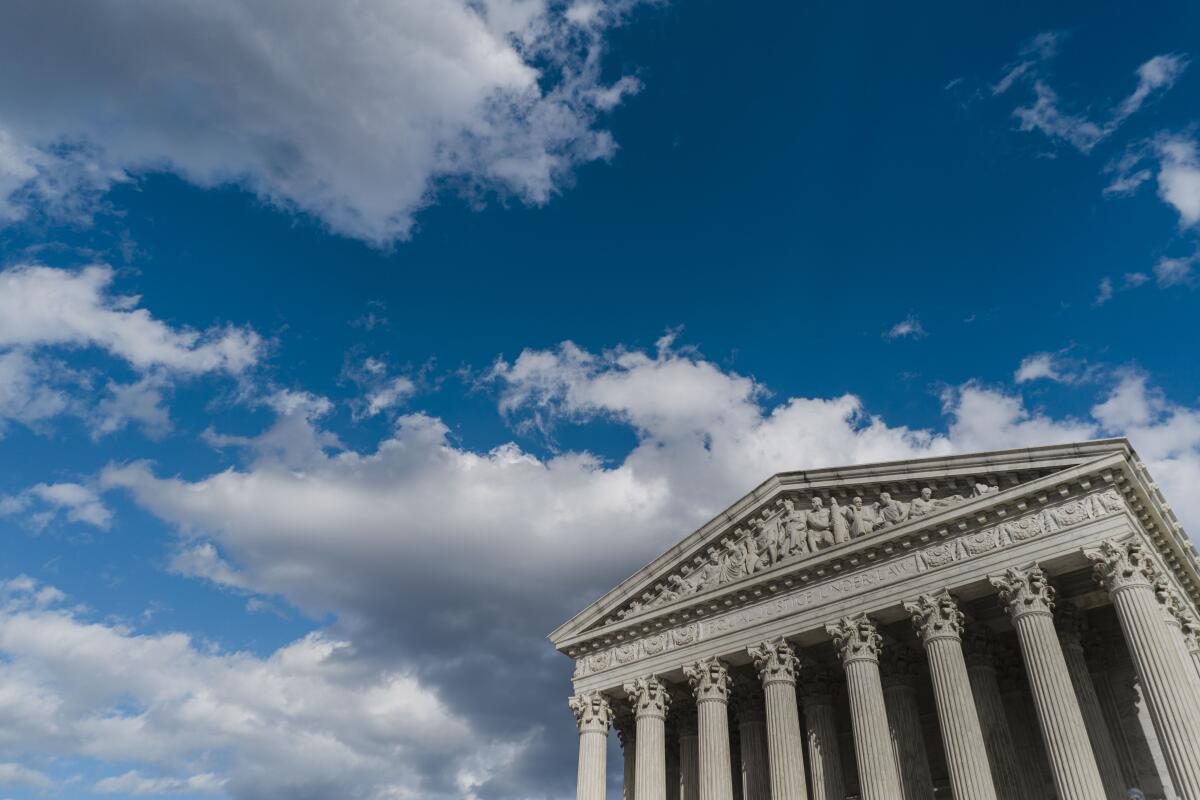Supreme Court leans in favor of Trump over Biden in asylum border dispute

- Share via
WASHINGTON — The Supreme Court justices gave a mostly skeptical hearing Tuesday to the Biden administration’s bid to repeal President Trump’s policy that has required tens of thousands of asylum seekers to wait in Mexico for their cases to be heard.
Several of the court’s conservatives said they agreed with Texas state lawyers and Trump-appointed judges who ruled that U.S. immigration officials may not allow the migrants to enter the country and go free pending their hearing.
They pointed to a provision in the law that said asylum seekers “shall be detained” while their claims are heard.
Solicitor Gen. Elizabeth B. Prelogar, representing the administration, argued there was no way the government could detain so many asylum seekers for months or years. She cited a report that said there were 220,000 migrants apprehended at or near the border in March but only 32,000 beds in detention facilities.
“No one disputes that the [Department of Homeland Security] does not have sufficient detention capacity” to hold all the migrants, she said.
The government’s only reasonable option, she said, was to release most of them if they are judged likely to return when their asylum claim is set to be heard.
Justice Brett M. Kavanaugh questioned whether that’s what Congress intended. Is there any hint “that anyone in Congress expected that if there was not sufficient detention capacity that hundreds of thousands of people would be paroled into the United States without being lawfully admitted?” he asked.
Chief Justice John G. Roberts Jr. agreed the administration’s position would permit an unlimited number of migrants to be admitted and released.
“There aren’t enough beds in detention. So there is no limit, as you read the statute, to the number of people that you can release into the United States, right?” he told the solicitor general.
In 2019, the Trump administration chose a different option and sent many of the Central American migrants back to the Mexican side of the border. Its officials did so believing the move would deter more migrants from traveling north.
Immigrant rights advocates argued that Trump’s “Remain in Mexico” policy was cruel and inhumane. They said it forced tens of thousands of people from Central America to live in squalid conditions subject to violence and abuse. Upon taking office, President Biden said he planned to repeal Trump’s policy.
But lawyers for Texas and Missouri sued and last year won nationwide orders from judges that required the new administration to maintain the policy. The U.S. 5th Circuit Court of Appeals upheld the order in the Texas case.
In August, the justices, by a 6-3 vote, refused an emergency appeal seeking to overturn the orders. And there was no clear sign during Tuesday’s argument that the majority will do so now.
Traditionally, the court has given the executive branch broad authority to enforce the immigration laws, including reversing the policies of prior administrations.
Prelogar said it would be a radical departure for the court to say the new administration must maintain the new policies put in place by the prior administration. Prior to 2019, no administration or member of Congress had asserted the immigration law required the government to detain every noncitizen who had a pending asylum claim, she said.
But lurking in the background is the long legal fight over DACA, the Obama-era policy formally known as Deferred Action for Childhood Arrivals. President Obama used his authority under the immigration laws to suspend enforcement against young people who were brought illegally to this country when they were children.
Trump moved to repeal that policy, but judges in California and New York put the repeal on hold. Lawyers for Trump argued that the new president had ample authority to revoke a discretionary enforcement policy adopted by Obama.
Two years ago, however, the Supreme Court by a 5-4 vote ruled against Trump and blocked the repeal.
Now in the case of Biden vs. Texas, the justices will rule on whether the new administration is free to repeal Trump’s “Remain in Mexico” policy.
A decision can be expected by late June.
More to Read
Get the L.A. Times Politics newsletter
Deeply reported insights into legislation, politics and policy from Sacramento, Washington and beyond. In your inbox three times per week.
You may occasionally receive promotional content from the Los Angeles Times.











